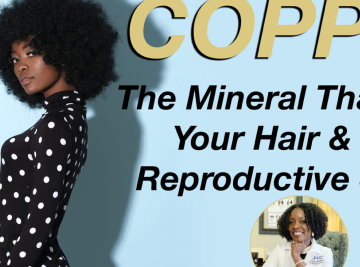Men and women differ in many aspects. One thing that really sets the difference is the make-up of the reproductive system of both sexes. Both male and female reproductive systems have unique and complex parts and functions. However, they both take part in the wonderful dynamics of procreation, and they are of equal footing in this matter. Considering the vital role of the reproductive system in the continuity of the human race, it is a must to give the proper care for this body system.

Copper is needed by the reproductive system. With this, you must realize that this mineral has a great impact on the continuous existence of humankind. To better understand why copper is essential for your reproductive system, take a closer look at every point presented in this article. Firstly, get to know the general impact of copper to your body, and then, find out how it particularly impacts your reproductive system.
Copper: A Closer Look
Copper is a trace mineral that has been used as treatment and medicine since ancient times. This simply means that the importance of this mineral in human nutrition has been recognized even in earlier times. To date, this mineral is a constant topic of studies to further unearth the health benefits that it can offer to the human race.
Do you know that you actually have copper stores in your body? The significant percentages of copper stores in you are found in your liver, heart, brain, kidneys, muscles, and skeleton. Having copper in these organs means that it is important in performing their functions, and aside from them, there are other body processes that require copper for their normal operation.
Health Benefits of Copper
For you to clearly recognize that copper is needed by your body, here are the health benefits of copper for your overall health and wellness.
● Energy Production
Copper is important in the adenosine triphosphate synthesis which is the storehouse of energy in your body. Because of this, your copper stores enable you to have functional and accessible energy which prevents you from feeling tired.
● Immunity Booster
This mineral maintains your healthy immune system for it makes it possible for your body to fight infection, and it also allows you to have better and faster healing of your wounds.
● Cognitive Functions
Copper is considered a brain stimulant and is often referred to as ‘brain food’. Once there is a regulated amount of copper in your body, this will make you capable of higher-order thinking skills, and it will even allow you to express yourself more creatively.
● Bone Health
Copper promotes healthy bones by playing a crucial role in collagen formation for your connective tissues and bones. A low level of copper in the body can lead you to have osteoporosis.
● Cardiovascular Health
This trace mineral prevents you from having cardiovascular diseases by lowering down your blood pressure. It also prevents the buildup of plaque in your arteries, and this can significantly defend your heart from having diseases.
● Thyroid Health
You must have a balanced copper level to ensure that your thyroid gland will be functioning normally, and this will prevent you from having hyperthyroidism and hypothyroidism.
● Melanin Production
Melanin is the one responsible for the coloration of your eyes, skin, and hair. Copper is an important component of melanin which is the natural dark pigment of these body parts. In this way, copper prevents you from having premature aging because this mineral enhances your eyes, skin, and hair health.
● Skin Health
Aside from melanin production, copper is involved in the elastin production which makes your skin flexible, and this will make you look younger. Also, this mineral prevents you from having wrinkles and sagging skin.

https://unsplash.com/search/photos/skin
The Mineral the Helps Your Hair & Your Reproductive System
Also, apart from the production of melanin, this mineral can restore the health of your hair by increasing your hair follicles. This benefit of copper can put a stop to your hair loss and can even prevent your hair from graying.
Copper and Your Reproductive Health
Indeed, copper is essential in numerous body functions. This time, let’s get a closer look at how this mineral impacts your reproduction. As mentioned, the reproductive system is considered as one of the most important systems in your body for it plays a vital role in the survival of humankind. Unlike the other body systems which are concerned only for your survival as an individual, the reproductive system ensures the survival and continuity of the human species.
Copper is actually termed as ‘feminine mineral”, but it also plays a significant role in male fertility. This mineral is needed in the production of the male gametes, and there’s a substantial amount of copper in the liquids related to the sperm in the prostate and epididymis. However, there have been research findings that present how copper really helps in the normal functioning of the female reproductive system, thus, it is called as the ’feminine mineral’.

The following key points explain the significance of copper in the female reproductive system:
Copper and Menstruation
Menstruation is experienced by women monthly, and a significant number of women experience premenstrual syndrome (PMS). These days, this has been known as a serious disorder for it has been the cause of suffering among menstruating women. A woman with PMS can experience emotional, mental, and physical symptoms before menstruation. These symptoms include headaches, breast tenderness, loss of appetite, weight gain, fatigue, constipation, and joint pains.
Copper plays a crucial role in your menstrual cycle. Your copper level increases when you are about to have your menstrual period. This happens when zinc and copper compete for intestinal absorption, and copper tends to be absorbed faster than zinc. With this, as a woman, you must know your copper level to avoid copper imbalance during your premenstrual stage.
Copper and Fertility
This trace mineral supports healthy fertility among women. Copper is found to be of lower concentration for women with fertility problems while it is found to be of normal concentration for fertile ones. Thus, the copper level in your body affects your fertility because copper imbalance disrupts your normal estrogen metabolism. In addition, copper is found to be one of the chemicals that compose your cervical mucus.

https://unsplash.com/search/photos/pregnant
Copper and Pregnancy
Since copper helps in the formation of red blood cells, this is very much needed when you are pregnant because your blood supply doubles during this time. Copper is important in your pregnancy, particularly in the fetal health and development of the fetus in you.Studiescan support the importance of this mineral in the normaldevelopment of the fetus inside you, and could even result in birth defects if there is a copper imbalance.
Your baby could have gross structural abnormalities like skeletal, cardiovascular, or pulmonary defects because of copper imbalance. Research has revealed that copper has a vital role in the normal formation of the notochord which is the structure that helps in the development of the spine. A pregnant woman needs 1 mg of copper daily that will result in the normal formation of your baby’s blood vessels, heart, skeleton, and nervous system.
What If You Have Copper Deficiency?
Truly, copper is one of the essential nutrients in our body, particularly to your reproductive system. What will happen when you have a low level of this mineral in your body? If this is so, you are then suffering from copper deficiency or hypocupremia. When you are deficient in copper, you will definitely experience some health risks. A copper deficiency can actually harm your body in multiple ways.
How will you know if you are deficient in copper? Here is the list of symptoms that you might be experiencing because you have a copper deficiency.
- Weakness And Fatigue
Your cells use copper to generate adenosine triphosphate (ATP), and it is the body’s main source of energy. Copper is one of the essential minerals that are responsible for the absorption of iron from the gut. Less iron will be absorbed if the body’s copper levels are low. In this case, you may develop iron deficiency anemia linked to a copper deficiency that can make you weaker and can easily feel tired.
- Sickness Attack
It is linked to a copper deficiency when you often get sick. The reason for this is that copper plays an essential role in maintaining your immune system. The immune system struggles to make your immune cells, and these little cells are the ones responsible for combating bad cells in your body. So as a result, white blood cells drastically reduce their number, and this makes you sick often.
- Bone Brittleness and Breakage
Copper is involved in the creation of cross-links inside your body. These cross-links act as a checker for ensuring that you have strong and healthy bones. So, copper deficiency is said to be the culprit for having weak and brittle bones that can cause you to have osteoporosis.
- Skin Sores and Pale Skin
As mentioned, the enzymes use copper to produce melanin. With this, the melanin pigment in our skin determines our skin color. The lighter your skin color is, the less melanin your body produces. On the other hand, the darker it is, the more melanin your body has. Therefore, a lower level of copper can affect the production of this pigment which will cause you to have pale skin. Due to this, soreness of skin can also be experienced because of the pale-skin colored.
Knowing these red flags will make you aware of your risk of having a copper deficiency. With these symptoms, it proves that copper deficiency impacts not only our reproductive system but our whole body. Copper deficiency can result in abnormal metabolism and poor overall health.

https://unsplash.com/photos/rNPfyRYqjHY
Copper Deficiency and Your Hair
Just like your reproductive system, your hair needs copper too. In addition to the reproductive system, copper significantly affects the growth of your hair. Copper helps you to have healthy hair. To start with, copper is an important mineral for the hair because it is particularly responsible for its pigmentation. Hair depigmentation is caused by low copper levels.
Loss of pigment in your hair indicates that your copper intake does not meet the copper requirement of your body. This can be caused by poor blood circulation which means that copper and the other important vitamins and minerals do not reach your hair follicles, and this results in hair problems. Actually, low levels of copper will not automatically lead you to baldness, rather, it will just hamper your hair growth . Still, you have to be conscious of it for this may signal a chronic disease.
Hair problems can indicate a nutritional issue. Here are some of the diseases which link copper deficiency and hair nutrition.
Menkes Disease
A person with copper deficiency is at risk of having Menkes Disease , and this usually happens among children. A person with this disease will have a significant drop in the absorption of copper in the intestines. One of the symptoms of Menkes Disease is having unusual steel-colored kinky hair.
Alzheimer’s Disease
This disease is also one of the impairments linked to copper deficiency. Hair loss is a side effect of those who are under the medication of Alzheimer’s disease .
Neutropenia
Neutropenia is also caused by low levels of copper and is linked to hair loss. The link lies when cancer patients undergo chemotherapy and radiation therapies which cause hair loss as a side effect.
A hair mineral analysis is a test that uses strands of your hair to test for nutritional deficiencies. It can identify mineral imbalances in your body. A Hair mineral analysis reveals the hormonal imbalances that you potentially have and is highly recommended to help find the cause of any nutritional imbalances you may be suffering with.
Copper Deficiency and Your Reproductive System
Here are the reasons why a copper deficiency can significantly impact your reproductive system:
- Copper deficiency has been found to be connected with ovarian inactivity and low level of serum progesterone .
- A low level of copper is also connected to pregnancy , prenatal development, recurrent miscarriages, and unexplained infertility.
- In an experimental study , it was proven that deficiency in copper can produce a lower level of ejaculates, poorer sperm motility and morphology, and lower sperm concentrations among males.
However, copper deficiency has something positive to contribute to the female reproductive system as observed in a study among rodents, and this can reflect its impact among human beings. It was surprising that this mineral deficiency was found to protect female rodents from mortality.
The Recommended Intake
Having recognized the importance of copper in your reproductive system, and upon observing that copper deficiency symptoms are manifested in you, you have to check your copper level and increase your copper-rich food intake . An adult person must have around 900 mcg of copper daily while it must only be 700 mcg and below for children.
You have to maintain the recommended copper level in your body because this mineral is vital for your reproductive system. Your body cannot produce copper on its own, therefore, you can only make copper present in your body once you consume food rich in it. Upon ingesting copper-rich foods, it will be absorbed in your small intestine, and from there it will then be beneficial to your reproductive system.
Fortunately, copper is abundant in the environment for there is a wide variety of animal and plant foods that contain this mineral. To increase your copper intake, here are some of the food sources that you can include in your meals:

https://unsplash.com/search/photos/nuts
- Seeds
- Nuts
- Wheat-bran Cereals
- Shellfish
- Chocolate
- Whole grain products
- Organ meats
- Potatoes
- Mushroom
- Tofu
- Avocado
- Salmon
- Spinach
- Asparagus
- Yogurt
- Apples
Final Thoughts
Undoubtedly, copper is an essential mineral for a healthier life, particularly to the reproductive system. Women, in particular, should be mindful of their copper levels for this may lead to prolong copper deficiency and may result in hair problems and chronic diseases. It is better to recognize how copper affects your overall health condition, especially your reproductive system. This trace mineral plays significant roles in the premenstrual stage, in menstruation, in pregnancy, and in the growth and development of the fetus. Thus, if you want to have a productive reproductive system, be conscious of your copper intake.




